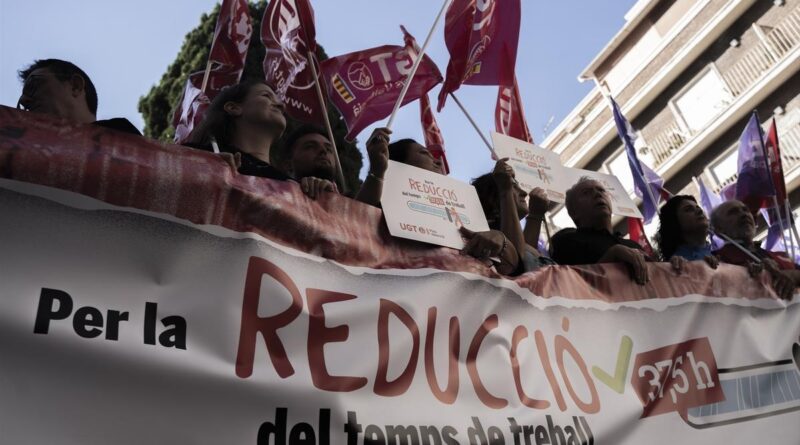Let's impose a real reduction in working time!
“The reduction of the workday is an indispensable condition for the emancipation of the proletariat; Not only does the health and material conditions of workers improve, It also releases time for education and cultural activity. " León Trotsky, “The Revolution Betrayed” (1936)
By Gérard Florenson
The project to reduce to 37 Hours and a half, promoted by Yolanda Díaz and the union addresses, He faces the living opposition of business, that predicts cascades or, As minimum, innumerable difficulties, especially for small businesses, Those that always put themselves ahead to protect the interests of the great. Nothing new, As we will see.
In the heart of class fight
THE WORK TIME QUESTION, Like that of wages, He has always been at the center of the clashes between capital and workers. To extract more surplus value, Business constantly seeks to reduce real wages and make workers work more, No consideration for their living conditions. For the proletariat, It is a vital claim not wanting to lose your life for a salary that barely allows to subsist.
The industrial revolution had a huge cost in premature deaths, bodies shattered by exhaustion1. It was the labor struggles that forced governments to prohibit child labor, to reduce the working day to 10 hours and then 8, The latter being a claim that became an international cause of class fight, conquered country after country2.
Every time, The "poor patterns" claimed that they were slaughtering them, that factories and mines could not work without child labor, that the two hours that were "stolen" were those who took a little benefit, that would be forced to close the business. Marx and Engels - among others - dismantled these statements, And we find (Unfortunately) that the exploiters are still there and remain equally rich.
The eight -hour day was a relief, But they worked six days a week and there was no vacation, except some rarely paid job parties. The pension boxes were very scarce; It worked until total physical inability or death. The pensions and vacations were the subject of other struggles that ended up being victorious, imposing reforms that the business never gave.

Spain was no exception
Faced with the rise of struggles and progress in the organization of workers, The liberal government chaired by the Count of Romanones3 decreed the 3 April 1919 The eight -hour day. The employer's response to this concession to the working class was, Of course, immediate. in Catalonia, that together with the Basque Country was the most industrialized region, Treball Foment was its engine. This employer organization was at open war with the CNT trade unionists. He promoted false unions called "free" and created a bourgeois militia, the lieutenant, With the support of the Military Governor of Catalonia, A militia that did not hesitate to assassinate trade unionists.
The first president of the FOMENT, Albert Rusiñol, He was one of the founders of the regionalist Lliga, The match of the Catalan right then led by Francesc Cambó, The most authentic representative of the Catalan bourgeoisie. Not surprisingly in the support of the Lliga to the employer arguments, as well as to the creation of the Subject: Between justice and order, Lliga always chose order!4.
The right at the service of the patterns: in Catalonia is JUNTS
As seen, the current controversy around a possible week of 37,5 hours does not lack precedents. The business is fiercely opposite to a reform as well5 Y, as usual, It has the support of right -wing games. No surprise from Vox and the PP, But in Catalonia the "Front of the Friends of the Patterns" has an additional member: TOGETHER.
This does not surprise us, As now We explain in other articles: Junts is the party of patterns and owners, A Catalan right that is the worthy heiress of the Lliga and that allowed recycling, during the transition, of the Catalan bourgeois who made fortune under Franco. We hope that this new episode will contribute to open the eyes of those who still believe in the great interclasist unit of Catalanism.
A reform that can be a trap
Regarding the reduction of working time itself, Of course we are not going to oppose, Although it seems insufficient to absorb unemployment and is far from returning to employees the productivity profits that have increased the benefits of patterns for decades.
But above all - and the example of 35 hours in France demonstrates it - if the law is adopted, It will be necessary to fight so that its application is not accompanied by concessions to the business, Financial compensation, o Flexibility in work organization (37,5 average hours, But a real duration that changes according to employer needs: 30 Hours a week, 45 other, Disappearance of surcharge for overtime).
Let's not trust at all in the Government, much less in the leaders of UGT and CC.oo. It is the workers who, by themselves, They must impose a reduction in working time that responds to their interests. The first trap will consist in proposing to negotiate company by company the modalities of application, under the pretext of adapting to local realities, which actually means that patterns will impose their law where the balance of forces is favorable to them, where employees are not organized, with blackmail to the dismissal or to the closure included. And all this, probably, With the understanding of the government ...
Given this, We must impose claims that join all sectors: Creation of jobs in proportion to the work time released. No salary reduction, premiums or compensation. Pause maintenance, Additional rest days and usual bridges. Payment with surcharge of extra hours beyond 37 hours and a half.
Notes
1 In France, At the end of the 19th century, It was the military authorities who alarmed the unfortunate health state of the young workers recruited by the army. But that mattered little to the patterns, that replaced the worker fallen by another that lasted for a while.
2 Little known story: in Spain, The eight -hour day had been established in 1593 By Felipe II for construction workers. This reform did not survive the industrial revolution, When the business imposed everywhere a strong increase in working time!
3 The two games called "dynastics", for being both monarchists, They alternated in power.
4 To look good, Cambó invoked, yes indeed, The social doctrine of the Church and wanted a good understanding between patterns and workers ...
5 Among the "poor entrepreneurs" in danger, the hospitality and restoration sectors are cited, Although it is in areas without law, where precariousness reign, Black work and unpaid hours.




